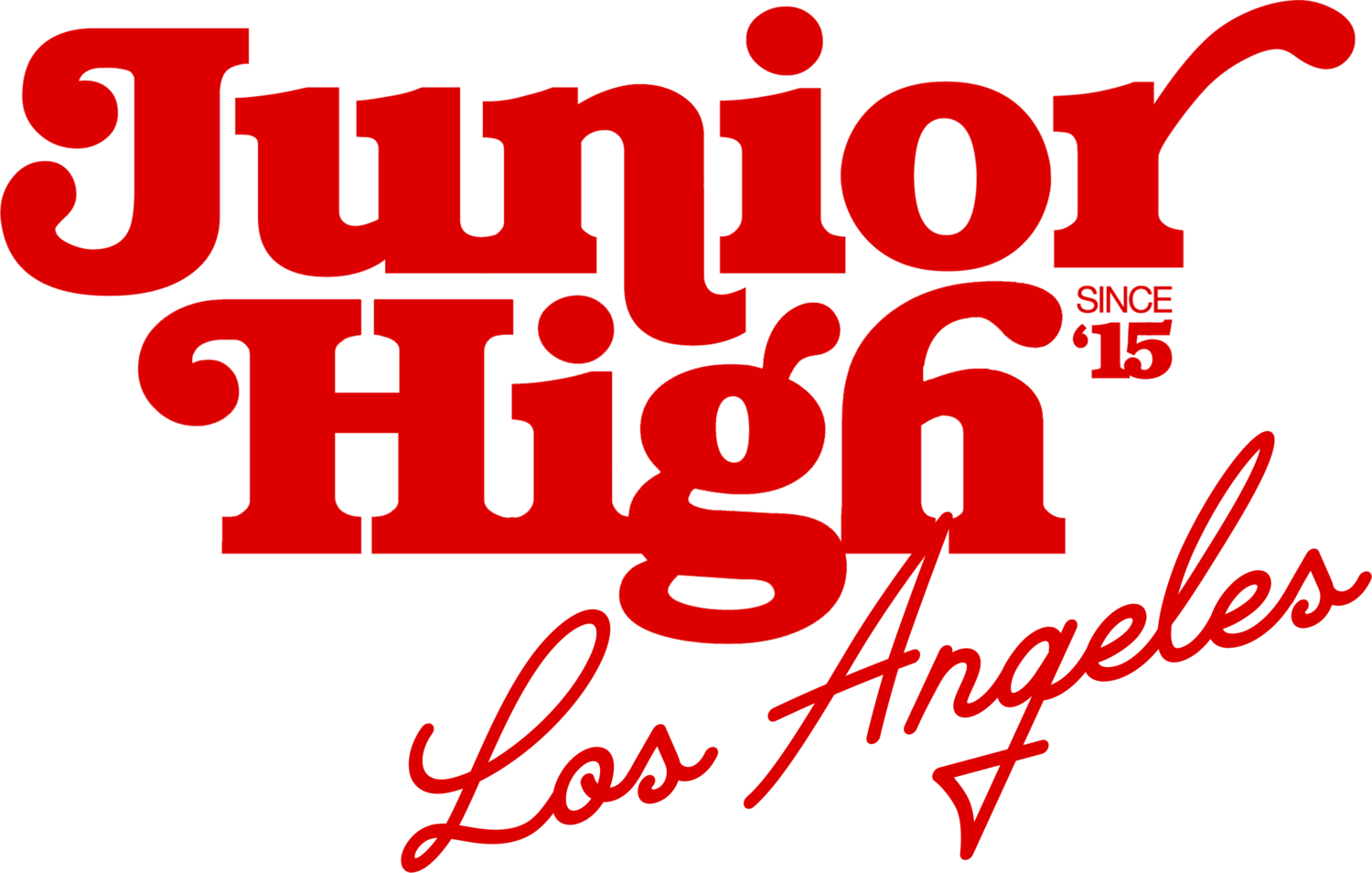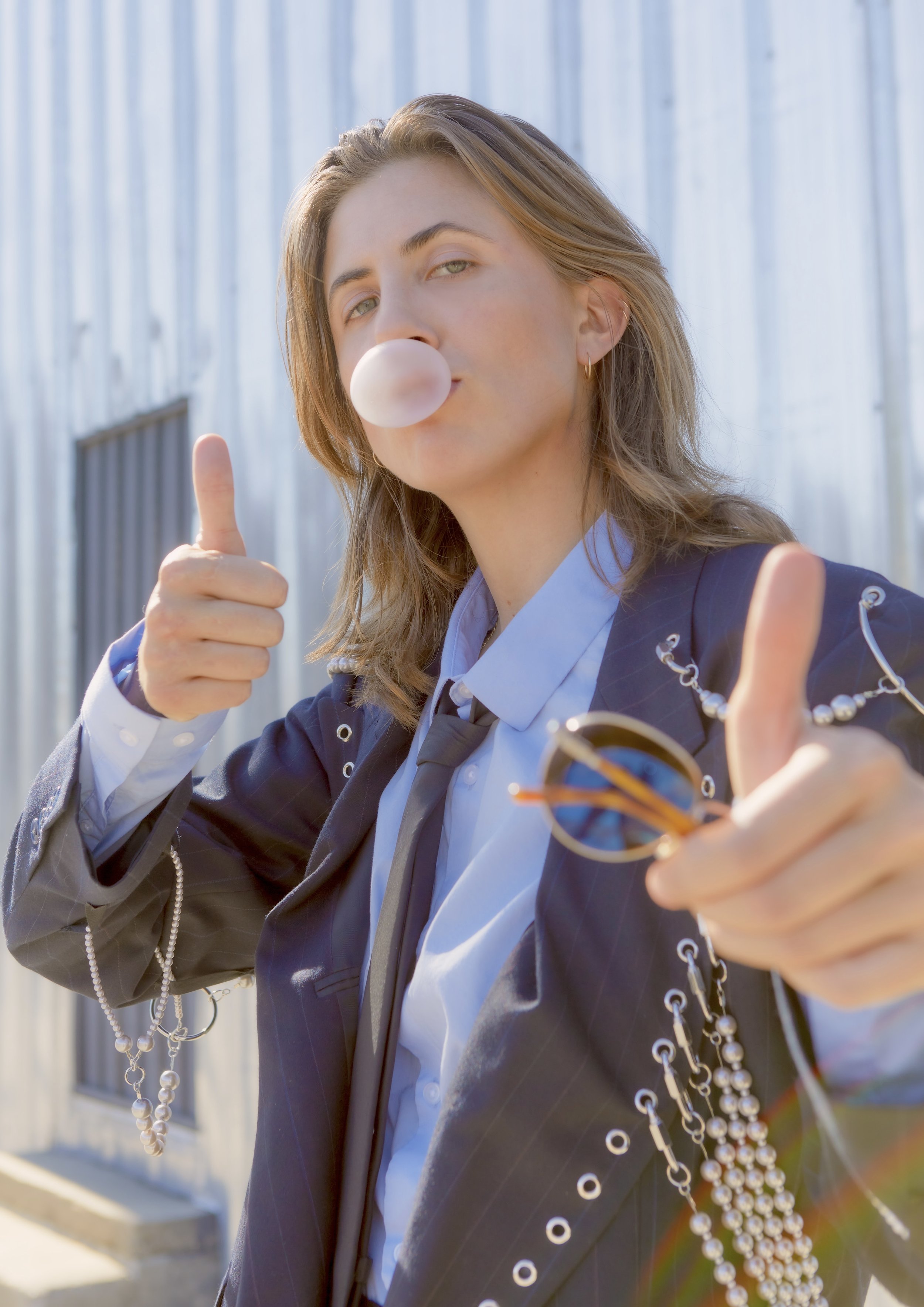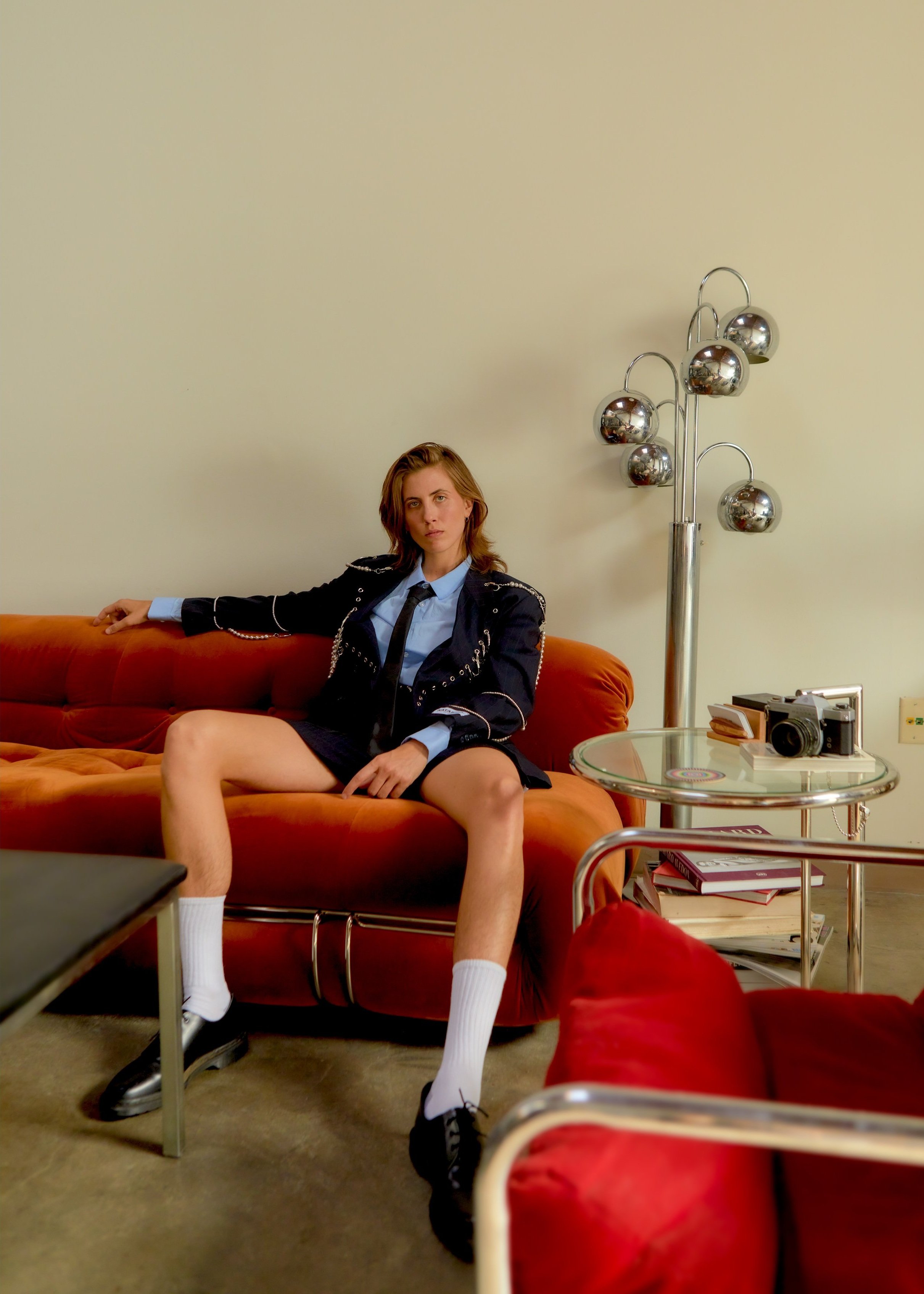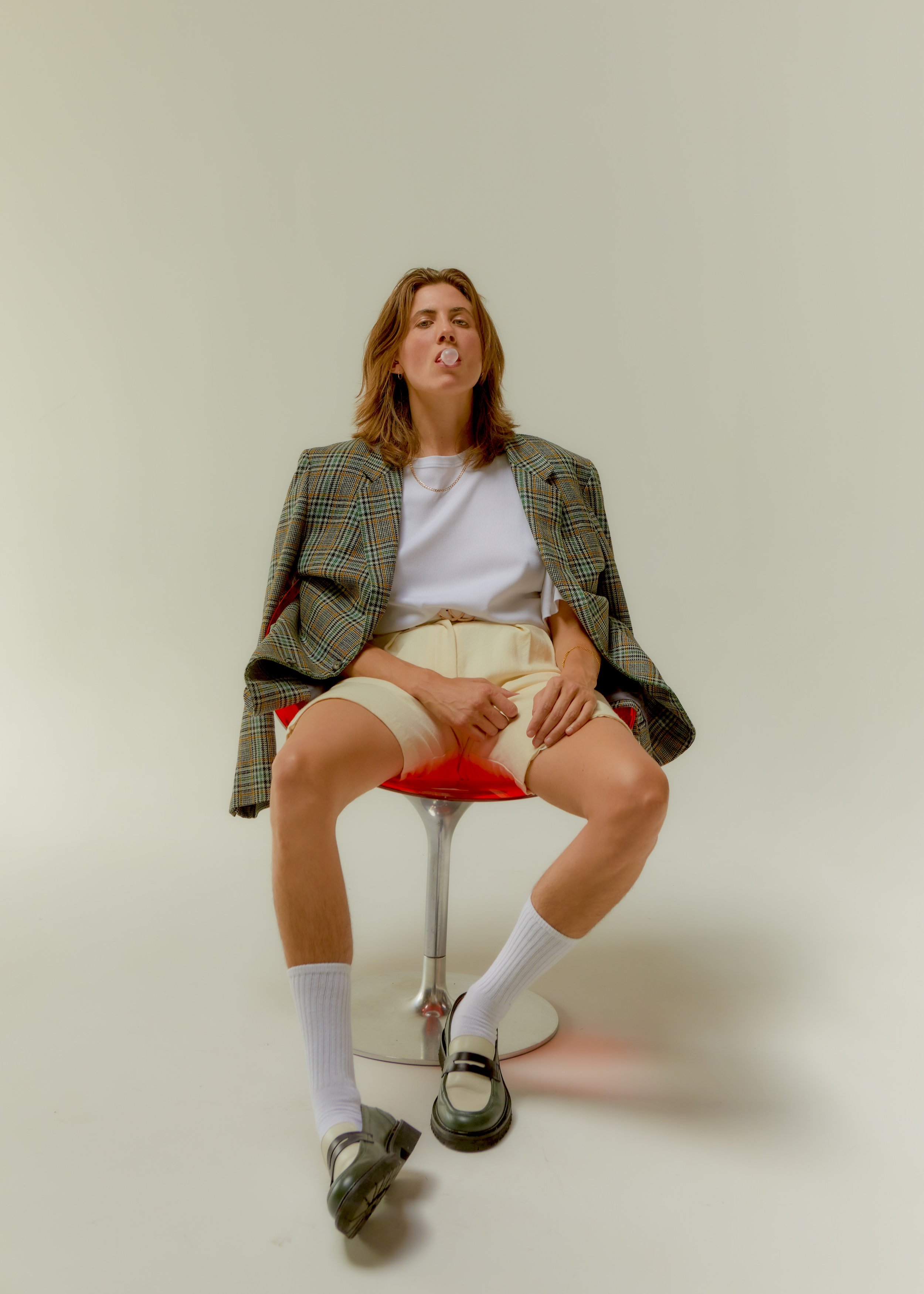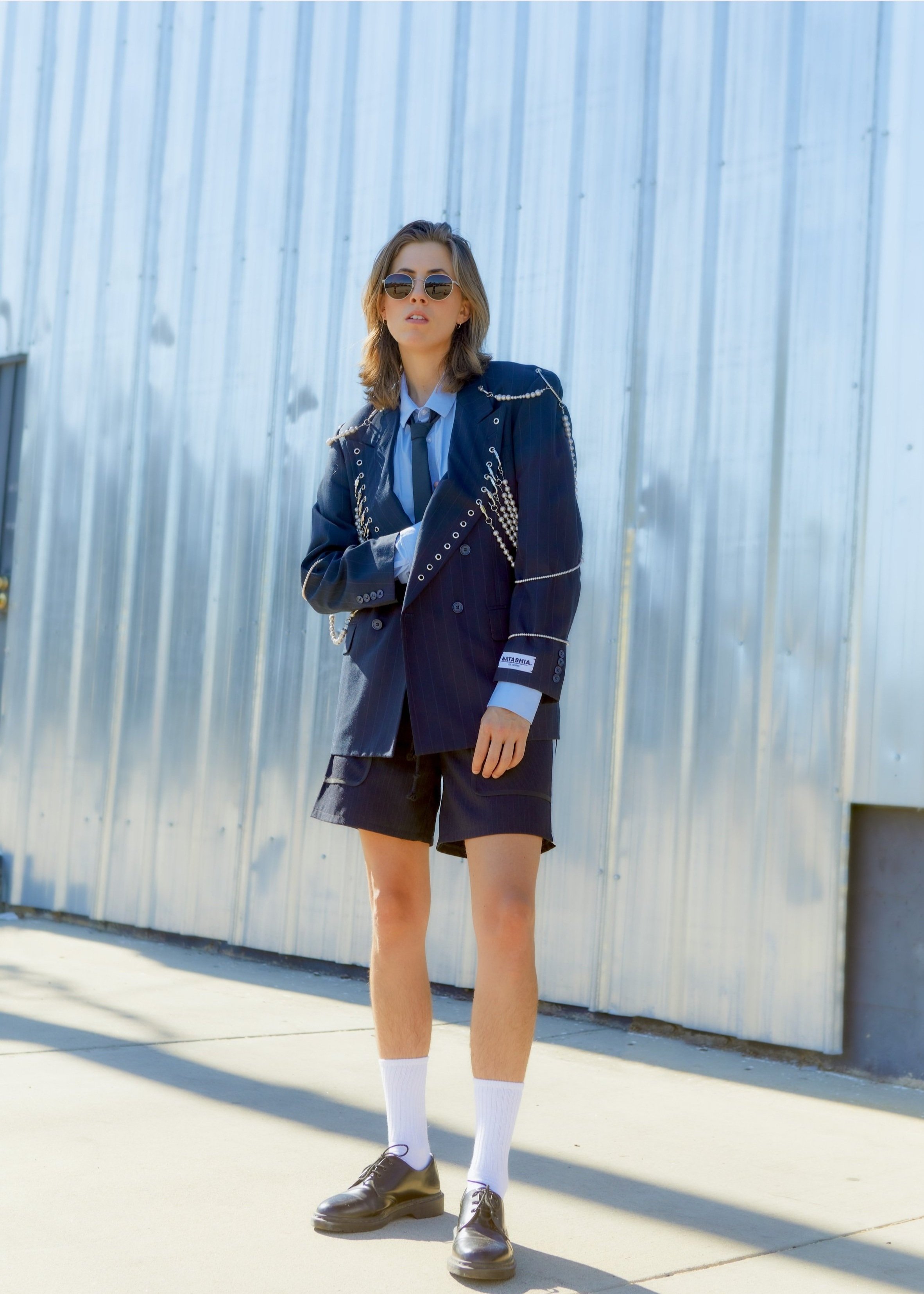E.R. Fightmaster is Embracing Their Hot Shame
⤏ ACTOR AND MUSICIAN, E.R. FIGHTMASTER ON RECLAMATION, MASCULINITY, AND THE MAKING OF THEIR DEBUT EP, VIOLENCE
⤏ IN CONVERSATION WITH BELLA DI CARO
⤏ PHOTOGRAPHY BY AUDRYANA CRUZ
⤏ STYLING BY BRANDEN RUIZ
Welcome to a forty-five-minute conversation where I —Bella— have the pleasure of interviewing E.R. Fightmaster. To provide some context, I received this opportunity after noticing we had done a photoshoot with E.R. The conversation went something like this ….
Me: *frantically messaging Gisselle in a gay panic* ARE THEY COMING TO JUNIOR HIGH HOLY SHIT
Gisselle: you want to interview them? *eye emoji here*
Me: yes, yup, yeah.
And just like that, I found myself scheduled for a Zoom interview. In our conversation, we delved into topics such as pronouns, transgender identity, and their latest EP, Violence. However, what the final cut doesn't reveal is the seven minutes and 34 seconds I spent hyping myself up beforehand. During that time, I took a hit from a bong and tried my best not to dwell on just how cool E.R. is—all of which Gisselle, our fantastic editor, was privy to. So, as you tune in, even if I may appear calm and composed (fingers crossed), know that I was internally freaking out just as much as any of you might be in the same situation. Enjoy the gay panic.
BELLA DI CARO: It’s interesting how you intersect both mediums because you are both an actor and musician. Which one would you say feels more true to yourself? Or feels more vulnerable?
E.R FIGHTMASTER: I think they inform each other and the best musicians become actors on stage because they give the audience an experience. The songs themselves are about vulnerability, and having both skill sets is very helpful. I really think right now I could give a great live show to an audience in part because actors are trained to be embodied and I’m an improviser. I came from comedy so we’re trained to be with an audience —the acting side is we’re trained to be with an audience, and the music is training yourself to be vulnerable. They’re all interlocking in a way [where] I feel really whole making this project.
BD: It’s fantastic. As a non-binary artist, how has your identity influenced your musical narrative, especially in a project as personal as Violence?
ERF: There’s no part of Violence that’s not queer. That’s for sure. I really wanted to create my own little world in which I wasn’t having to explain gender. I was just doing it. Gender really is a performance but just because it’s a performance doesn’t mean it’s not important and crucial to you, and your identity. So Violence is a performance of what my understanding of masculinity looks like. It’s that masculinity in a state of turmoil and in a state of love —which is a very violent experience. My identity cannot be separated from this art at all.
BD: I personally found it really interesting that you titled it, Violence because typically violence —the word— paired with LGBTQ or trans individuals is seen in the news in a very negative light. I was wondering if that shaped you when naming it Violence and reclaiming that word?
ERF: Absolutely. It’s a total reclamation. It’s a reminder in this world that has been so violent to us that we deserve to experience joy, sex and love and depression, devotion and community. We deserve to experience all these things. And in order to experience all these things we have to violently protect ourselves and one another. I think love puts you in the mindset of being able to be violent for your community. The violence that’s enacted towards trans people is so hollow. It’s this political violence that’s meant to dominate and control. But our violence is so rich. It’s a completely different understanding of the word. Our violence is rooted in our soulful love of one another so when they come head to head they look like different things. Their violence looks cold, and ours looks lush. The whole EP is meant to mirror that lushness.
BD: That’s special and I think that’s a very queer-centric idea that a lot of people don’t understand. I was having this conversation earlier —relationships in the queer space vs relationships in the heteronormative space are very different. Comparing the two is a disservice. I really like that you’re touching on that. It’s really important.
ERF: Thank you, I appreciate it. It’s been a really fun, mental place to be in. Writing this and making this artwork was happening in a time that seeing all this violence towards the community was making me feel very unwell. So, this whole piece was this opportunity to go inside, and focus on how I was feeling but also focus on all the things that were making me feel alive, and were making me feel happy. And then make art that was by me for my community which feels good. It’s got the same basic feeling of, I made a plate of cookies for someone who’s sick. I’m not going to fix all their ills with these cookies but dammit it’s going to taste good.
BD: And even though I know I can’t always have this cookie in the world —now this cookie is a metaphor— you can always draw back to it like that time someone really cared about me. Your EP really embodies that.
ERF: My EP is the cookie. I love that. That makes me feel so happy. The way I feel about queer people is I can feel a true resting place for me spiritually [with] arms wide open. I feel like the biggest armed person specifically for embracing my community. It feels like such an honor to tailor make something for queer people to listen to. It’s completely tailored to our queer asses.
“There’s no part of Violence that’s not queer.”
BD: You talked a lot about fulfilling a demand that was lacking in the community. There’s not too much of this warmth of violence or this love or queer stuff in music. Did you feel at all pressured from the outside to create a certain mold or were you like, “fuck it I’m doing what I want if they like it they like it.”
ERF: I am absolutely influenced by all the artists in my life. We’ve got so many great queer musicians that are recognized right now. Every time I do an interview I want to bring up the people that I know that are doing such a good job being queer and being public and giving people these gay anthems to listen to. We have this wealth of queer music right now. The reason that this music is so important is actually because all of these artists have a very strong understanding of self. For me, I say the music is catered to the audience. It’s catered because it’s everything I wanted. It was everything that I wanted to hear in a song, it was every feeling I had shaped in a way that found it exciting, and beautiful, and horny, and angry. It was all those things, and because I’m queer, and I have a grasp of my own identity. It feels custom made for the queer audience. I do think queerness is this political, and spiritual understanding of self so it’s really easy as a queer artist to make the people that are listening to yourself say, “Is this for me?”
BD: I want to talk more about specific songs. "Bad Man" explores attraction outside of cishet norms. Which ones were you playing on specifically and how did you fit yourself into that role?
ERF: The song is a response to this cishet male obsession with gatekeeping masculinity. I don’t want their masculinity. I don’t want to dominate and control other people. I don’t want to be nervous that someone thinks I’m gay. I don’t want to never do self care because “That’s for queer people.” Their masculinity is so tenuous. My masculinity is so grounded. So “Bad Man” is their worst nightmare. I actually think that cishet men can actually feel that I am the thing they’re pretending to be and women and femmes can feel from me that I am the thing they’re attracted to without the unnecessary insecurity and domination that they’re used to from patriarchal men.
BD: You’re going directly against everything society has laid out.
ERF: I think the men that I know that have big dicks, and big hearts have really enjoyed this song. I’m really only targeting the short thumbed men.
BD: It’s cool to see someone actively doing the work that we could always talk, and dream about. You have a platform and you’re able to do all this. “Cowboy Tumbleweed” —my favorite because I can’t get it out of my head— talks a lot about feeling inadequate. Did you pull from personal experiences of feeling less than society or in specific roles?
ERF: “Cowboy” is such a sweet song. In my mind it’s about falling in love with someone but while I was falling in love with this person I was actually in a massive depressive episode. The intrusive voices there are talking about inadequacy but the real worry for me inside was that this person that I love is so joyful, and through my depression I was going to bring her down. It’s this love song that’s “I’m very here. I’m very proud to be present. I’m very excited about you and I can feel myself receding into my own brain. I hope those things can level out.” It’s never about the other person when you’re experiencing depression. What’s so wonderful about this partner —and this is how the song gets this upbeat feeling— is that she's so filled with joy. She was able to not absorb my heaviness. And sometimes when they’re not absorbing your heaviness you’re able to actually look at yourself and think, “What am I making all this fuss about.” It slowly pulled me out of the well to watch her be happy and realize I wasn’t bringing her down.
BD: How does “Hot Shame” reflect your personal journey? Do you feel like you are at all connected in that body and self-reclamation?
ERF: Well, I’m just a shame based little dog boy. My pronouns are they/them, shame based little dog boy. I do think I struggle a lot with shame. That’s something that I’ve been really working on, how I deal with my shame, and how I filter my shame through my brain and out of my body. This was just one of the songs that came to me in a moment of feeling like I was in trouble. Feeling overwhelmed, ashamed and in trouble. Literally hearing my name come out of someone’s mouth and being like, “I can tell I disappointed you.” I also think the name thing is very trans. We all have the experience. We all understand how specific our names are to us and how much shame fills your body when you hear your deadname. So finding these parallels between this trans shame we’re burdened with —that’s not ours— and this personal shame that we’re working through that’s also probably not ours. The power of music is that you can present your audience with a topic that’s normally hard to swallow and then you can make it fun, funky, sexy and catchy. So “Hot Shame” is about processing your shame through trans funk.
“I don’t want their masculinity. I don’t want to dominate and control other people. I don’t want to be nervous that someone thinks I’m gay. I don’t want to never do self care because “That’s for queer people.” Their masculinity is so tenuous. My masculinity is so grounded.”
BD: I think the shame you’re talking about is because of how society is structured. The shame all queer people are feeling or trans and nonbinary feel is because of an outside source and the constructs we have created and accepted as norms. Anything that strays out of the norms we’re like, “Well maybe you shouldn’t be so proud of that.” The most radical thing you can do is just be yourself in society but that’s also one of the hardest things. I think “Hot Shame” makes it funky and fun when you’re depressed and feeling a lot of shame.
ERF: I’m already in the process of writing a new album and I learned so much when writing Violence. One of the things I realized and came to understand so clearly was when I was a teenager I struggled so much with depression and I sought out music that was slow and dark to mirror that depression. I do think they informed each other in a way that could make things worse.
BD: Oh yeah. When you’re sad and in that space you seek out things that are reassuring the sadness and reaffirming the sadness. If you listen to something happy it creates a disconnect in your brain like, “wait I’m listening to this happy song but I feel really depressed and it doesn’t match.” So we seek out the comfort of the sadness. It’s validating us. I feel like this is a really good thing because shitty things can happen but we can still feel good.
ERF: I want to give kids the option. I want to be cognizant of my audience. I have a bunch of trans kids and queer kids that are really struggling with their mental health because of what they’re experiencing. I don’t want to give them music to harm themselves to. That’s the most literal I can be with it. As a kid I was listening to music I could psychically harm myself to because I was struggling. Now I want to acknowledge their experience and talk about shame, talk queerness, talk about falling in love, and talk about depression. I'm not going to give them a beat to turn the lights off and disappear. You have to dance.
BD: How was the experience of collaborating with producer Riley Geare, and how did he help bring your creative vision to life?
ERF: Riley is the best. I love working with Riley. He gave me so much space to be creative and he’s a really big “Yes, and…” person. I would write the lyrics and music in my house and I would record them on a voice note and send them to him. He would be like, “I can already hear it.” Then I'd go to the studio and we’d break it down. He’s really good at synthesizing my ideas. So when I played him, “Bad Man” all I had was a voice note of the bass and me singing over it. He picked the tone for the bass that I laid down and the tone was exactly the song. The song became itself because he found the tone. It’s really awesome to find a collaborator who can hear what you’re hearing. It makes the whole experience so free. I never have to prove a song to him and he drums on every track. He lays down some instruments here and there. He’s so beyond competent in everything he does. He’s a really great pocket drummer. He’s got such a funky vibe to him that I’m always happy to have around.
BD: What do you envision for Violence? What would the dream be of what it looks like performing it?
ERF: I’ve been performing these five songs for the last couple of months. They are such fun songs to perform. A lot of people in the audience are queer and there’s a lot of women and a lot of men that were brought there by their girlfriends. By the end of it everyone walks out having had a really great, electric time. That’s what I want to provide. I want to provide a really safe, fun, intoxicating time for people. I want people to come and feel good. I recently went to a concert and every single person there was a white man in his 40’s and it was psychotic. It was a nightmare and the worst part is they kind of just grit their teeth to the music but they don’t dance or anything. I want to create the opposite. I want to create a space where a bunch of people feel welcome, where a bunch of people feel safe and get to dance. That’s my ideal art form. That I get to bring this to people that are ready to fucking rage. That’s what I want.
